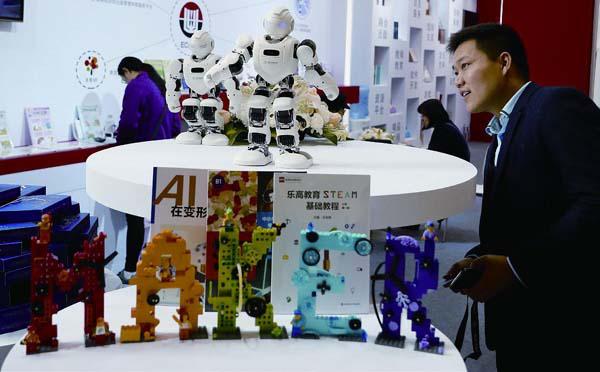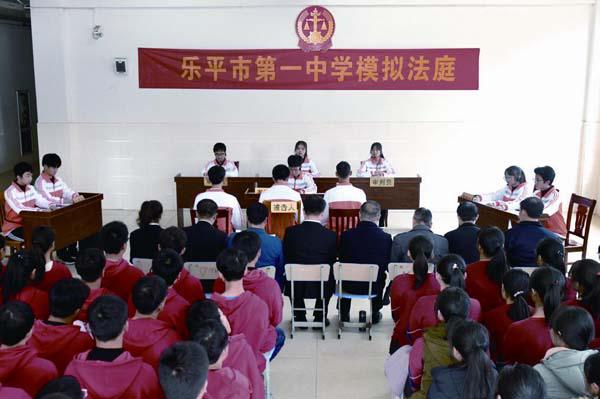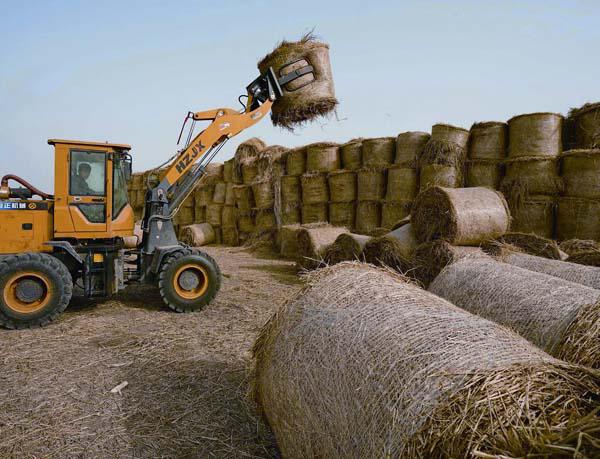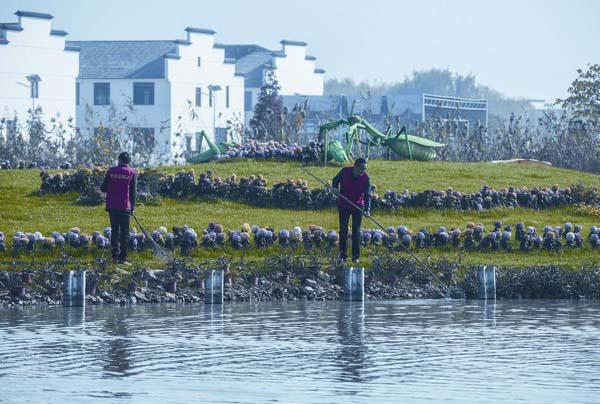Square Dance
2018-12-18
A team performs during the Second Provincial Square Dance Competition in Fuzhou, southeast Chinas Fujian Province, on November 30. Square dance, an open-air pastime, is popular among senior citizens in China.
Red Cross Makover
A recently approved reform plan for the Red Cross Society of China(RCSC) is expected to make the organization more effective, an RCSC offi cial said on December 3.
Because of new circumstances, the mission and targets of the RCSC have undergone profound changes, and demands and approaches for humanitarian services will transform, the offi cial said.
The world also expects China to play a bigger role in global affairs, and building a community with a shared future for humanity offers the RCSC a broader fi eld in which to play a role, placing higher demands on its capacity and vitality, according to the authorities.
Only through exploring mechanisms with more effi ciency, transparency and standardization, as well as solving problems that affect its work can the RCSC perform its duties better, the unidentifi ed offi cial continued.
The reforms include pushing forward innovation in administrative organizations, human resources and RCSC operations, in order to let Red Cross societies at all levels become more closely linked to the public and have more transparency and credibility.
“All sectors of society will be encouraged to take part in our activities,” said the offi cial.
The RCSC will stay peoplefocused as it works on emergency rescue, humanitarian aid, voluntary blood and organ donation.
The society has also agreed to improve its information disclosure by posting receipts and disbursements of funds and goods on a unifi ed information platform, allowing for public supervision.
2019 Graduates
The Ministry of Education said on November 29 that a total of 8.34 million college students are expected to graduate in 2019, many of whom will face great challenges in fi nding jobs or starting businesses.“We have the conditions and capabilities to deal with challenges and diffi culties, as the countrys economy is steady and the business environment keeps improving,”said Vice Minister of Education Lin Huiqing at a video conference on college graduate employment.
Lin called for more efforts in education for career planning and special training for students who have diffi culties fi nding jobs.
Employment discrimination should be rejected, Lin said, adding that there should be an effort to fi ght employment fraud.
Frugality Violations
Chinas top anti-graft body said a total of 68,509 offi cials were punished for violating frugality rules in the fi rst 10 months of 2018.
The offi cials were involved in 48,456 cases, said the Communist Party of China (CPC) Central Commission for Discipline Inspection (CCDI) and the National Supervisory Commission in a statement.
On December 4, 2012, the CPC introduced an eight-point frugality rule on work style, requiring offi cials to condense meetings, reduce ceremonies and exercise thriftiness.
The CCDI has a monthly reporting system on the implementation of the austerity rule within provinciallevel governments, central Party and government agencies, centrally administered state-owned enterprises and central fi nancial institutions.
On October 27, 2017, the Political Bureau of the CPC Central Committee reviewed a document, which listed detailed rule requirements to better and further implement the frugality rule nationwide.
Last year, more than 71,000 offi cials were punished for similar violations.
Hotel Hygiene
Chinas Ministry of Culture and Tourism (MCT) is looking to send examination teams to a string of hotels that were exposed by the media as allegedly having serious hygiene problems.
According to reports, cleaning staff at several posh luxury hotels were caught on camera washing cups, sinks and mirrors with dirty rags, towels and sponges, causing public concern and drawing the attention of the ministry.
The teams will work with local culture and tourism departments, other related authorities, the China Tourist Hotel Association and experts to mainly examine the hygiene, fi re control and security work of the hotels, the MCT said in a statement released on December 3.
It further asked all hotels to carry out self-examination and rectifi cation based on the problems in management and services, improve their credibility and personnel management, stick to quality standards and comprehensively enhance their management level and service quality.
Most of the exposed hotels are part of big international hotel chains, such as the Conrad Beijing, Le Royal Meridien Shanghai and the ShangriLa Hotel Fuzhou.
Some of the hotels have apologized and received punishment from local authorities following the MCTs call on November 15 for culture and tourism authorities at all levels to tighten monitoring on tourism service quality.
Self-Driving Tests
Beijing is expanding its lead in the development of Chinas self-driving technology with a plan to build a 200,000-square-meter testing ground for self-driving vehicles, Beijing Daily reported on December 3.
The enclosed testing ground is expected to open by 2020 in Shunyi District, about 30 km northeast of downtown Beijing. It will require an investment of 480 million yuan($69.7 million), according to the newspaper.
Domestic auto manufacturers and Internet companies will also build their research and development bases for new energy and intelligent vehicles in Shunyi, according to the plan.
Many cities in China, including Beijing, Shanghai and Chongqing, have issued self-driving car licenses for public road testing this year.
Beijing has renovated and reopened 105 km of roads and highways located mainly in its suburbs, including the Yizhuang Economic Development Zone and Shunyi and Haidian districts.
Robot Culture
A visitor views robots at the opening of the fi rst Yangtze River Delta International Cultural Industries Expo in Shanghai on November 29.
Social Credit System
China will take enterprises credit data into consideration during the approval process of initial public offerings in an effort to develop a national social credit system, China Daily reported on December 4.
Enterprises with past records of untrustworthiness will be strictly examined by securities regulators when applying for initial public offerings and the issuance of convertible bonds, according to a memorandum of understanding(MoU) issued by the China Securities Regulatory Commission (CSRC) and the National Development and Reform Commission (NDRC).
In addition, the government will pay close attention to enterprisescredit information after issuing approvals.
“The new MoU does not represent a signifi cant policy shift from the current approval procedure. It is expected to give warnings to market participants failing to obey the rules,” an offi cial with the CSRC said.
The move is part of Chinas broader goal of developing a system aimed to build a culture of trust in society, collecting data in various fi elds.
The broad social credit system is expected to rank individuals and en- terprises, and violators with unethical behavior will be punished according to the rules.
The system, which is expected to be fully operational by the end of 2020, will play a role in serving the non-fi nancial sector and creating a fair business environment, Zhang Chun, an offi cial with the NDRC, said.
The commission has signed more than 40 memoranda of cooperation with different regulatory authorities, and has launched more than 100 measures, including rewards and punishments, Zhang added.
Moot Court
Students learn about the Chinese Constitution at a moot court at Leping No.1 Primary School in Jingdezhen, east Chinas Jiangxi Province, on December 4, Chinas fi fth Constitution Day.
Easier Shipping
Foreign shipping companies will fi nd it easier to establish wholly owned subsidiaries in China thanks to a revised regulation due to take effect on January 1, 2019.
The newly revised rule states that the ministries of commerce and transport will be responsible for managing rather than approving the setup of fully foreign-owned shipping companies in China.
Applicants can go through relevant procedures with business regulators as required by the Law on Foreign-Funded Enterprises and other related administrative rules, according to the new regulation.
To qualify for engaging in business operations, foreign companies must follow corporate registry rules to get business licenses from the industrial and commercial administrative departments and obtain a business permit from the departments in charge of transportation.
The previous stipulation requiring the proportion of Chinese employees to be above 85 percent in wholly foreign-owned shipping companies has also been removed.
Green Tower
A full electric vehicle charging tower at the headquarters of automaker BYD in Shenzhen, south Chinas Guangdong Province. The company has become a leader in Chinas new-energy vehicle industry, selling more than 110,000 such vehicles in 2017.
Loan Innovation
The aggregate consortium loans provided by Chinese banks reached 6.97 trillion yuan ($1 trillion) in the fi rst half of 2018, up 8.87 percent from the end of last year, industry data showed.
The funds have mainly gone to shantytown renovation, construction of indemnifi catory housing, transportation and warehousing, the postal services, manufacturing, water conservancy, the environment and public utilities, according to data from the China Banking Association (CBA), a non-profi t industry organization.
Pan Guangwei, CBA Vice President, said fairly good economic and social benefi ts had been achieved as the projects fi nanced by consortium loans were all signifi cant to the development of the real economy.
Compared to conventional loans extended by a single bank, syndicated loans are often led by large banks and enjoy the advantages of dispersing loan risks, reducing peer competition and encouraging profi t-sharing among lenders.
Pan advised domestic banks to become more involved in the service to jointly ease private enterprises fi -nancing diffi culties, especially those engaged in overseas projects under the Belt and Road Initiative.
“Cross-border fi nancing is relatively harder for private enterprises as they dont know enough about the market and legal environment as well as the social and economic background of host countries,” Pan said.
A big data informationsharing platform may help banks to do cross-checks, share customer resources and boost fi nancial innovations, he said, adding that the CBA was leading the implementation of a pilot mechanism on joint credit granting to facilitate consortium loans.
Farm Fresh
Fresh farm produce from northwest Chinas Xinjiang Uygur Autonomous Region and other provinces now is more quickly served on the dinner table of families in Central Asia, thanks to optimized customs services.
The value of agricultural product trade via Urumqi Customs reached 661 million yuan ($96.7 million) in the fi rst 10 months of the year, up 7.95 percent year on year, according to fi gures released by customs authorities.
The main exports included apples, peaches, citrus fruits, peppers and tomatoes, while the export growth of ketchup increased 12.8 percent year on year during the same period.
The Horgos Highway Port is one of Chinas most important distributing centers, exporting fruit and vegetables to Central Asia. Wei Chunguang, a customs offi cial, said a gricultural goods from Xinjiang and other Chinese provinces can reach markets in Central Asian countries as quickly as in a day via the port.
“With the new highway port put into use this year, the average customs clearance time has been shortened from four hours to two,”Wei said.
Other land customs including at Buktu Pass, Karasu Pass, Turgat Pass and Irkeshtan Pass bordering Kazakhstan, Kyrgyzstan and other Central Asian countries also offer effi cient customs clearance services to ensure fresh farm produce goes through in two hours.
Xinjiang has 13 national demonstration zones to guide farmers to grow high-quality farm produce that meets the criteria for exports. The region also has 19 vegetable planting bases, 120 orchards and 40 fruit packaging factories with licenses for exports.
Recycling Straw
A worker from a forage processing plant in Liutaizhuang Town, north Chinas Hebei Province, stacks recycled straw on November 28. The practice improves multipurpose utilization, increases farmers income and prevents pollution due to straw burning.
Monetary Policy
China will make appropriate adjustments to its macroeconomic policies, especially monetary policies, based on changes in economic situations, according to Yi Gang, Governor of the Peoples Bank of China (PBC), the countrys central bank.
Efforts will be made to enhance counter-cyclical regulation, Yi said, in an article published on December 3 in a fi nancial journal on the occasion of the 70th anniversary of the PBC.
“The central bank should always maintain economic and fi nancial stability as an important goal, since the success of any fi nancial reform cannot be realized without a sound economic and fi nancial environment,” Yi said.
According to him, when the economy gets overheated or there are asset price bubbles, measures must be taken to ensure a “soft landing.”
“During an economic recession or when the economy suffers external impacts, timely measures must be taken to stabilize the fi nancial market and boost public confi dence,” he said.
In addition, the PBC will strike a balance among fi nancial reform, development and stability, the governor said. The PBC will develop the fi nancial market, push forward fi nancial reform and expand opening up while maintaining fi nancial system stability, ensuring continuous fi nancial services and forestalling systemic fi nancial risks, Yi said.
River Guardians
Huang Shuangxi (right), river chief of Beitang Town, in east Chinas Zhejiang Province, clears debris from the Shijiabian River with a colleague on November 28.
River chiefs are responsible for resource protection, pollution prevention and control, and ecological restoration, according to a nationwide scheme launched in 2016.
Boosting Car Sales
Chinas plan to expand its pilot parallel import program in free trade zones (FTZs) will offer customers more choices and further open up its automotive industry, China Daily reported on December 3.
The State Council, Chinas cabinet, announced in November that all of Chinas 12 FTZs will be allowed to pilot the parallel import program. Furthermore, the FTZs are encouraged to offer bonded storage for such imports, according to the newspaper.
Unlike traditional car importing, the program does not require auto dealers to import strictly from carmakers, thus the vehicles involved will be new to the Chinese market, providing more choices for customers.
Started in Shanghai in 2015 and expanded to some other FTZs since, the program is a key measure of the ongoing supply-side reform in the automotive industry, said Chen Zhenchong, an offi cial from the General Administration of Customs. It also helps facilitate car sales in China and increase the number of imports, Chen added.
In the fi rst three quarters of the year, 95,871 vehicles were imported to China under the program, up 5.9 percent year on year, data from the administration showed.
To promote the program, China has announced plans to scrap time limits on parallel vehicles bonded storage in FTZs. The move will allow importers to have a more fl exible sales plan, without worrying about paying taxes on the vehicles before they are sold.
